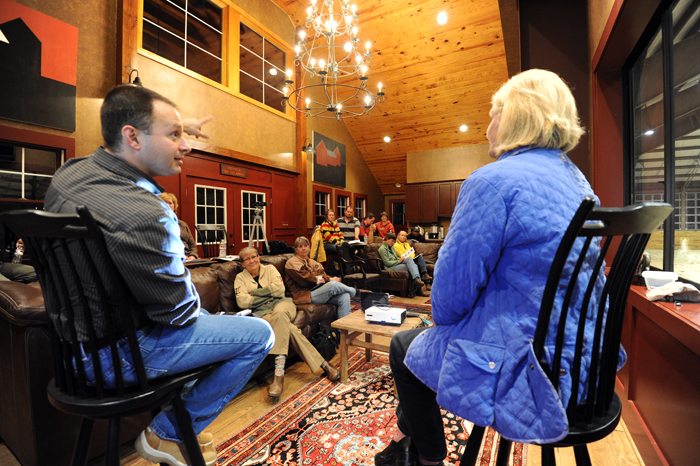
Last Tuesday I had the pleasure of presenting my annual local seminar on equestrian sport psychology – Five Pillars of Success. I look forward to this every year because it gives me the opportunity to reflect on how my thinking and my practice has grown and changed. Each year I seem to have one or two new insights/ideas which need some time to germinate and grow before I am ready to incorporate them into my practice and talk with clients about them. This year it was the seeming disparity between what people want or expect from sport psychology and what they ultimately need.
Most people connect to sport psychology through what they see in the media and what they read in the popular press. In an effort to raise public awareness and market sport psychology, the vast majority of this type of information is focused on clearly defined and easily described skills and techniques. While these skills are often very helpful to riders who are ready to apply them, it is important to be aware that not everyone has the same level of readiness to use these skills effectively. Just like in any other learning situation, different people bring different levels of readiness to their learning. This readiness can depend on many factors including life history, personal development, life experience, education, awareness, as well as many other factors.
What I realized in preparing for this year’s seminar is that sport psychology faces a great challenge in working with equestrian athletes. In order for sport psychology consultants to attract and motivate athletes to give sport psychology a try, they have to present a picture of sport psychology that is approachable, appealing and understandable. One of the necessary evils in following this path is that sport psychology and sport psychology consultation frequently get overly simplified. Subsequently, riders pick and choose amongst the easily approachable techniques seeking the promised results. Some enjoy a boost in their performance when adopting one or more “tricks of the trade.” Others, however, continue to struggle and might get discouraged and dismiss the potential of sport psychology to help them in their riding.
If only there was a way to let people know that these simple, clearly described and well-defined mental skills are only part of the puzzle and that, as athletes who are also human beings, we are complex creatures that differ in our readiness to learn and apply these mental skills. I wish there was a way to help equestrian athletes understand, honor and appreciate the richness of their individuality as it relates to their development as an equestrian and their participation in the sport. I wish I could inspire riders to start where they happen to be, and build whatever foundation is necessary to get them ready to learn and effectively use all of the tools and techniques that so many athletes find helpful. We would certainly want to do that for our horses, why not for ourselves.
One of the consistent findings in psychology is that our curiosity, courage and innate desire to explore and learn are governed or limited by how secure we feel. We have to feel “safe enough” in order to push ourselves outside our comfort zone and to be open to changing and doing things differently. So how do we promote this experience of being “safe enough” in our riding to engage our desire and ability to learn? How do we build a secure base or solid psychological foundation?
In my experience there are two steps that each of us can take to prepare ourselves for learning. These are the things that I most often end up talking about with riders before launching into the mental skills work. The first is to make sure we have built a solid psychological foundation for our riding. For me, that means to explore your motivations, goals, resources, assessment of risk, and relationships as they relate to your riding. We need to make sure that all of these factors are balanced with one another and that they are working together in concert. Mismatches among these foundational aspects of our riding always leads to difficulty and ultimately a lack of security in one or more aspects of our equestrian experience.
The second step is to work on our ability to better regulate and/or modulate ourselves and ultimately have greater choice over our behavior. I loosely define this as the ability to experience, tolerate and be more aware of our thoughts and feelings without having to automatically or reflexively act out on them. Notice that I am not suggesting that we think or feel less, rather I am suggesting that we be more aware of our thoughts and feelings, accept what we think and feel, and grow in our ability to separate our internal experience from our behavioral reactions and responses. Meditative practices are powerful tools in helping athletes grow in their ability to regulate or modulate their experience.
The pathways to creating a secure base for ourselves and our riding are not easily defined, and are as varied as the individuals that seek to build them. The vague and varied nature of this adventure can make it hard for people to value this work or commit themselves to it. Yet, it is this work that prepares us to effectively use the skills and techniques that sports psychology offers. The next time you bump into a roadblock in your riding, or find it difficult to make good use of a well-known and respected tool or technique, take a step back and ask yourself if you have put in the time and effort to make your psychological foundation strong.
Blog by Dr. Haefner @ www.RidingFar.com







0 Comments Posted Leave a comment